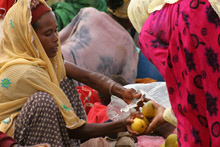
Typical street scene in Santa Ana, El Salvador. (Photo: iStock)
IMF Survey: Rekindling Growth in Low-Income Countries a Shared Task
December 6, 2010
- Priority is to restore strong, inclusive growth
- Fiscal space needed for infrastructure investment and social spending
- Enhanced global cooperation could help lift millions more out of poverty
Low-income countries, including in sub-Saharan Africa, are recovering much better than during previous recessions. But years of progress have been lost because of the global economic crisis and the food and fuel crisis that preceded it, said IMF Managing Director Dominique Strauss-Kahn during a visit to Brussels December 5-7.

Market in Ethiopia. IMF support helped low-income countries cope during the global economic crisis (photo: Andrew Burke/Newscom)
LOW-INCOME COUNTRIES
While the strong macroeconomic performance of low-income countries during the crisis is the “good news,”, the “bad news” is that fewer people were brought out of poverty, he said.
Strauss-Kahn was addressing a group of international parliamentarians at the Belgian Parliament as well as participants in European Development Days, a forum bringing together heads of state, parliamentarians, donors, international organizations, academics, and a broad range of civil society groups.
IMF support during the crisis
Good policies prior to the outbreak of the global financial crisis meant that many low-income countries had room to let their fiscal automatic stabilizers operate and increase real spending during the crisis. IMF support also made a difference, and helped protect the poorest and other vulnerable groups, Strauss-Kahn said.
During the crisis, the IMF quadrupled its concessional lending to low-income countries, offered at zero interest rates through the end of 2011. Almost 90 percent of countries with an IMF-supported program increased real spending, compared with 67 percent of countries that did not receive IMF support. In 2009, real spending on health and education in low-income countries was up by 10 percent, and public investment increased by 17 percent.
“This shows that IMF-supported programs helped countries to cope with the crisis and go further than they might otherwise have been able to do,” he said.
Making up lost ground
Despite such progress, the World Bank estimates that about 70 million fewer people will have escaped from the chains of poverty by 2020 because of the global financial crisis and the food and fuel crisis that preceded it. Many millions more will suffer the consequences of prolonged unemployment and underemployment.
In order to make up for lost ground, all must play their part—the developing countries themselves, the advanced economies, and the international institutions, Strauss-Kahn said. Cooperative action could boost world growth by 2½ percentage points over five years, create 30 million new jobs, and lift 33 million people out of poverty, according to IMF analysis.
Keeping promises on aid
Strauss-Kahn urged advanced countries to keep the Gleneagles promises on aid, and find ways of channeling financial support to help low-income countries overcome the challenges of climate change. “This is not the time to cut aid,” he said. At the Gleneagles summit in 2005, the Group of Eight leaders promised to double aid to sub-Saharan Africa by 2010.
Trade should also be opened up. This comes without budgetary cost and has the potential to unleash a wave of productivity and growth.
Strategy for growth
In low-income countries, the key priority is to restore strong, “inclusive growth” and make this growth more resilient to future shocks through homegrown policies, Strauss-Kahn said.
Rebuilding policy buffers would increase resilience and can be done in a way that still allows for space to invest in infrastructure and increase social spending, he said. A key priority must also be to strengthen domestic revenues.
Low-income countries should also seek to raise domestic savings and develop local financial markets, which would help make their economies more resilient to shocks and foster private sector activity, he added.
The IMF, for its part, would continue to play its role by providing policy advice and financing when needed. Its lending programs are now more flexible, and policy conditions have been streamlined, Strauss-Kahn said. The IMF supported countercyclical fiscal policies during the crisis, introduced a more flexible approach to debt, and advocated the protection of social spending. And it provides extensive technical assistance to support capacity building, including among the fragile states.
A major reform of the IMF’s governance structure in November 2010 enabled a 6 percent shift in quota shares to dynamic emerging market and developing countries, while protecting the voting shares of the poorest member countries. The Board of Governors, the IMF’s highest decision-making body, must ratify the new agreement by an 85 percent majority of votes cast before it comes into effect.
Strauss-Kahn said he hoped that the IMF could count on the support of legislators to secure ratification. He thanked Europeans for their continued collaboration with the IMF.


